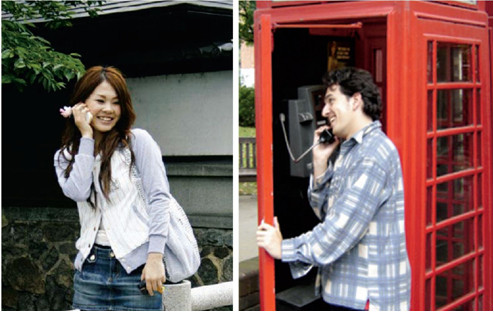Đừng bỏ lỡ những tính năng hấp dẫn của Baitap365.com

Unit 3: Ways Of Socialising - Các cách thức giao tiếp xã hội
Listening - Unit 3 trang 34 Tiếng Anh 12
Writing - Unit 3 trang 36 Tiếng Anh 12 Language focus - Unit 3 trang 38 Tiếng Anh 12 Test Yourself A - Unit 3 trang 41 Tiếng Anh 12 Speaking - Unit 3 trang 32 Tiếng Anh 12 Reading - Unit 3 trang 30 Tiếng Anh 12 Ngữ pháp: Câu tường thuật (Reported speech) - Unit 3 - Tiếng Anh 12 Ngữ âm: Trọng âm của từ có hai âm tiết - Unit 3 - Tiếng Anh 12 Vocabulary - Phần từ vựng - Unit 3 Tiếng Anh 12Listening - Unit 3 trang 34 Tiếng Anh 12
Work with a partner. Study the pictures and answer the questions. (Làm việc với một bạn cùng học. Khảo sát các hình và trả lời các câu hỏi.)
Before - 1
BEFORE YOU LISTEN (Trước khi nghe)

1. Work with a partner. Study the pictures and answer the questions.
(Làm việc với một bạn cùng học. Quan sát các hình và trả lời các câu hỏi.)
1. What are they doing?
(Họ đang làm gì?)
2. What do you think each of them would say to greet each other?
(Bạn nghĩ mỗi người sẽ nói gì để chào nhau?)
3. What do you think they would talk about?
(Bạn nghĩ họ sẽ nói gì?)
4. How long do you think it would take them to finish their call and why?
(Bạn nghĩ họ mất bao lâu để kết thúc cuộc gọi của họ và tại sao?)
Before - 2
2. Listen and repeat.
(Nghe và lặp lại.)
marvellous /ˈmɑːr.vəl.əs/ (adj): kì diệu
arguments /ˈɑːɡ.jə.mənt/ (n): tranh luận
regulations /ˌreɡ.jəˈleɪ.ʃən/ (n): quy tắc
absolute /ˈæb.sə.luːt/ (adj): hoàn toàn
maximum /ˈmæk.sɪ.məm/ (adj): tối đa
object /ˈɒb.dʒɪkt/ (n): vật thể
installed /ɪnˈstɔːld/ (Ved): được lắp đặt
adult /ˈæd.ʌlt/ (n): người lớn
startling /ˈstɑː.təl/ (adj): đáng ngạc nhiên
While - 1
WHILE YOU LISTEN (Trong khi nghe)
1. Linda Cupple, a social worker, advises young people on how to use the telephone in their family. Listen to her talk and decide whether the statements are true (T) or false (F).
(Linda, một cán bộ xã hội, khuyên người trẻ cách dùng điện thoại ở gia đình. Lắng nghe cuộc nói chuyện của cô và quyết định những câu nói đúng (T) hay sai (F).)
1. The telephone often causes arguments between members of the family.
2. A reasonable length of time for a call is the main problem.
3. Ten minutes is a reasonable length of time for a call.
4. Young people should not receive a call at dinner time
5. Young people often call their friends at night.
6. You can’t call your friends at any time even when you have a separate telephone.
While - 2
2. Listen to part of Ms Linda Cupple’s talk again and write the missing words.
(Nghe lại một phần của cuộc nói chuyện của bà Linda Cupple và viết những từ thiếu.)
Calling hours should be (1) ………upon. If your parents object to your leaving the dinner table to take calls, tell your friends (2)………….calling at that hour; if someone does phone, ask him to call back, or offer to call him when dinner’s over.
A serious calling problem is calling very late at night, or very early in the morning. This (3)……………….. mistake is made mostly by young people who consider 10 or 11 p.m, when a lot of tired (4)………..are happily sleeping, the shank of the evening. So please tell your friends not to call after ten o’clock. The shock of (5)…………..out of a sound sleep and the fright of that instant thought - “There’s an accident” - are enough to give your parents a (6)……… attack. Weekend morning calls aren’t so startling, but it’s the one time your parents can sleep late.
If your mother and father, out of (7) …………, have installed a separate phone for you remember that you’re still a member of a family. So try (8)………to your family's regulations.
AFTER YOU LISTEN
AFTER YOU LISTEN (Sau khi nghe)
Listen again. Summarize Ms Linda Cupple’s talk, beginning with.
(Nghe lại. Tóm tắt bài nói chuyện của Bà Linda Clippie, bắt đầu với).
In this talk. Ms Linda Cupple gives us some pieces of advice on how to use the telephone in the family.The first is to work out a reasonable.................
Mẹo tìm đáp án nhanh
Search Google: "từ khóa + baitap365" Ví dụ: "Bài 5 trang 13 SGK Vật lí 12 baitap365